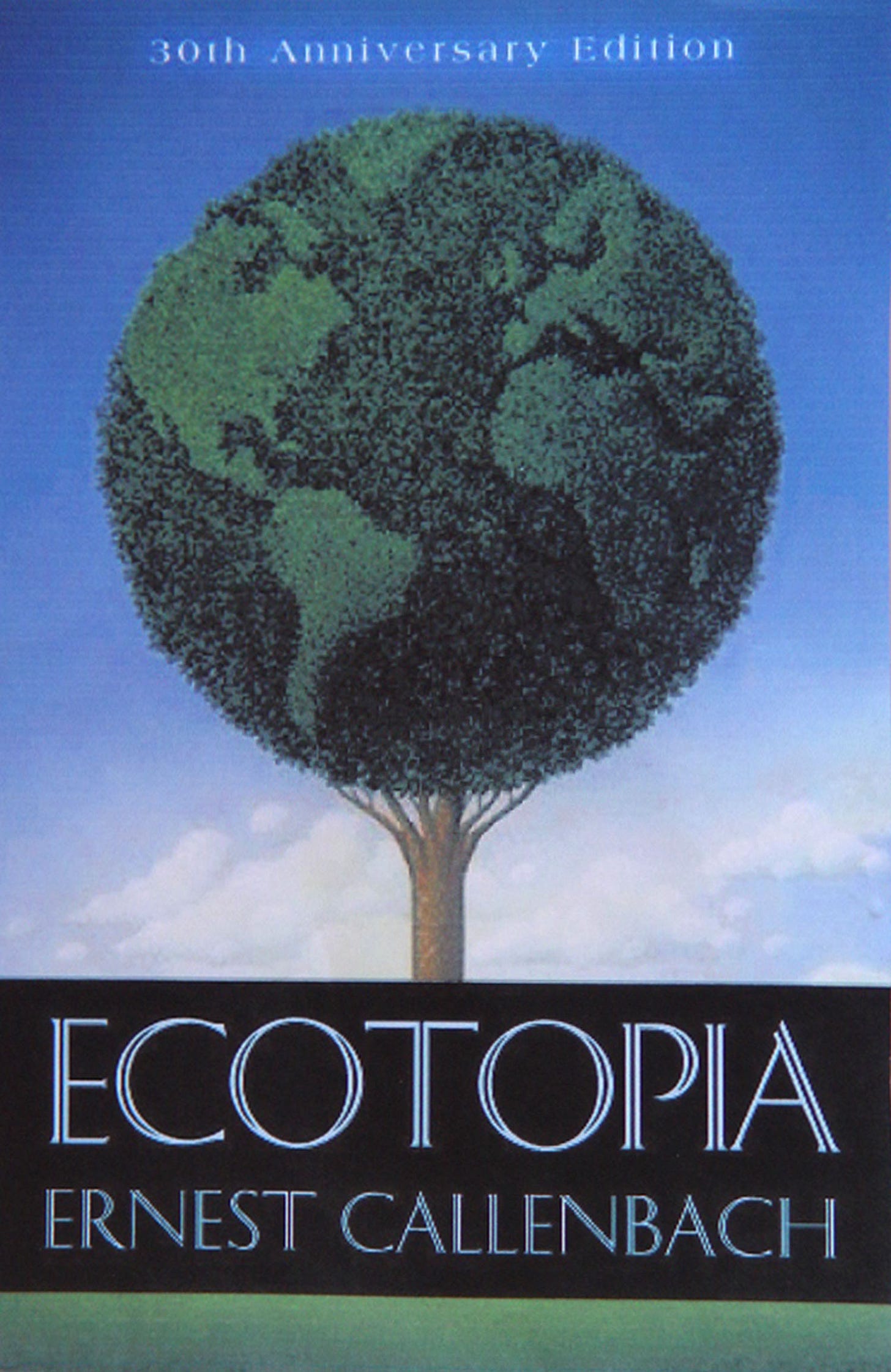Book Review: ECOTOPIA (1975) by Ernest Callenbach
Already as a child in the 1970s, I noticed the growing concern about damage to the environment — mainly in the form of pollution.
What I didn’t know was that some grownups were trying to seriously imagine a different, environmentally friendly way of life.
The 1975 novel ECOTOPIA has sold a huge number of copies. It is an early, quite ambitious attempt to describe a “green” society set in a near-future California. The depiction of this new nation called Ecotopia (which has seceded from the United States) is narrated by a visiting American reporter.
The narrator is a selfish jerk. He is constantly thinking about getting laid. And there is no shortage of willing women in Ecotopia, once he has figured out the proper (and simplistic) way of proposing to them.
Ecotopia is a “degrowth” society, where much technology has been scrapped to spare the environment. Gasoline-powered cars had to go, but there are trains and some electric vehicles. There is also an officially instated 20-hour work week.
Oddly, this degrowth does not mean the citizens have to work themselves to the bone to produce food and necessities. Slovenliness and pot-smoking is encouraged. And yet, magically, there is no hunger or poverty.
As a depiction of an imaginary society, ECOTOPIA is a coherent work. I like how the author tries hard to cover every single little detail of it. There are even some good predictions: Recycling and solar power, touted in ECOTOPIA, have actually became widespread in the developed world.
Even so, the inherent flaws in a utopia as such are too glaring to ignore. Ecotopia is simply too perfect to be believable. A real society has flaws, problems and grievances; Ecotopia has almost none. (And it got that way in just 20 years, in a newly created nation with millions of citizens.)
What bothered me most is how Ecotopia is such a "complete" society. It is as if all its traditions and customs and laws were settled in the past… and now nothing more needs to be discussed or worked out, except minor issues.
The result is a strangely uniform population: "Ecotopians are like this", "Ecotopians are like that"... how did they get to be so similar, so in agreement? By government edict? Were there persecutions? Deportations? Prison camps? Ecotopia is, the reader is being told, a decentralized society with libertarian leanings. Then why are Ecotopian citizens so conformist in their ways? This is not explained.
One rather peculiar detail is that for such a “green” society, nature itself is not given much narrative space. It is a mute backdrop to the tale of of how comfortable and happy humans are in Ecotopia.
As a reader, you might have expected some sentimental scenes where the narrator and his Ecotopian hosts admire the protected wildlife, existing for its own sake (perhaps while “Born Free” plays in the background)…
…but I read the whole book, and can’t recall even one such scene. When wild animals appear, they are hunted. Nature is there to be used (with some lip service being paid to “respecting” it).
Considering how many Americans carry guns, did this Californian utopia solve the problem of crime and violence? Yes. Through gun control? Nope. The solution presented in ECOTOPIA is — I kid you not — organized blood sport for the males, to work out their natural bloodlust. With real injuries and occasional deaths. It’s “Hippie Fight Club.”
It is explained to the reader how good and popular this blood sport is, and how well managed it is. (The first rule of Hippie Fight Club is: You talk too much about Hippie Fight Club.)
From this I concluded: One should not take for granted that environmentalists are necessarily all that “progressive.” ECOTOPIA’s blood sport scheme would also fit into an extremely reactionary — or fascist — society. The idea of “Returning To Nature’s Ways” can lead people into some dark corners.
The supposedly happy ending — where the visiting narrator sees the light and embraces Ecotopia — is unintentionally disturbing. It clearly reminds me of how people are recruited into cults, through the psychological manipulation technique called “love bombing.”
In the end, the born-again narrator happily stays in Ecotopia, leaving behind his family and kids in America. He can conveniently ignore them — for Ecotopia has rewarded him with a new, more exciting love interest. The greatest part of respecting the environment, the moral seems to be, is what you personally gain from it.
ECOTOPIA can be recommended as an ambitious thought experiment about an ecologically adapted society. But it is emphatically not recommended as literature (it’s more a tract than a novel).



